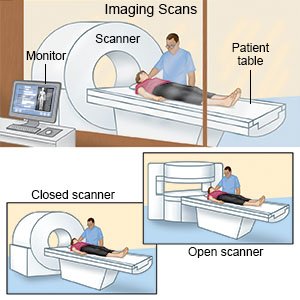Positron Emission Tomography Scan
Medically reviewed by Drugs.com. Last updated on Aug 4, 2025.
What do I need to know about a positron emission tomography (PET) scan?
A PET scan is used to take pictures of tissues and organs in your body. A small amount of radiation is put into your body before the PET scan. The radiation is called a tracer. The tracer collects in an area and gives off energy. A computer analyzes the energy and creates pictures of the area being examined.
Why may I need a PET scan?
A PET scan may show an abnormal growth, such as a tumor. It may be used to show if cancer has spread. A PET scan may show disease, damage, or injury to your brain, lungs, heart, or abdomen. You may need a PET scan during treatment for a disease to check how you are responding to treatment. A scan may also be done after you finish treatment so healthcare providers can check how well treatment worked.
How do I prepare for a PET scan?
- Tell your healthcare provider if you are pregnant or think you might be pregnant. Also tell your healthcare provider if you are breastfeeding. The tracer can be passed to your baby. You may need to pump and store breast milk before the test. You can use the stored milk while you wait for the tracer to leave your body. Your healthcare provider will tell you when it is okay to breastfeed your baby again.
- Tell your provider about all medicines you currently take. He or she will tell you if you need to stop any medicine for the test, and when to stop. He or she will tell you which medicines to take or not take on the day of your scan.
- If you have diabetes, your healthcare provider will help you plan when to take your diabetes medicine. Your blood glucose level must also be in control on the day of the scan. High glucose levels can affect your test results.
What can I eat and drink the night before the PET scan?
- Do not eat breaded meat or gravy. Only grill, bake, or pan broil any meat you eat.
- Do not use white dressing if you have salad. Only steam any vegetables you eat.
- Do not eat carbohydrates, such as potatoes, pasta, rice, chips, or bread. Carbohydrates turn into glucose (sugar) in your body. This can affect your test results.
- Do not eat dairy foods or diet dairy foods, such as milk, cheese, or ice cream. Dairy foods contain carbohydrates that can affect your test results.
What can I eat or drink on the day of the PET scan?
Your healthcare provider will give you specific instructions for eating and drinking before your scan. He or she may tell you not to have anything except water for 4 to 6 hours before your scan.
What will happen during a PET scan?
- You may be given the tracer through an IV, as medicine to swallow, or as a gas you inhale. You will need to remain as still as possible for 1 hour as the tracer moves through your body. Healthcare providers may give you sedative medicine through your IV to help you feel calm and relaxed.
- You will lie on your back on a table attached to the PET scan machine. When the PET scan begins, the table will move through a large hole into the middle of the machine. You will need to lie still while the scan is being done. Healthcare providers may ask you to change positions between pictures. A camera will take pictures of your head, neck, chest, or abdomen. The pictures will appear on a monitor.

What are the risks of a PET scan?
A PET scan uses a small amount of radiation. The radiation from the scan may increase your risk for cancer. If you are pregnant or breastfeeding, a PET scan may harm your baby. Small growths in your body may not be found with a PET scan. If the results are unclear, you may need another PET scan.
Care Agreement
You have the right to help plan your care. Learn about your health condition and how it may be treated. Discuss treatment options with your healthcare providers to decide what care you want to receive. You always have the right to refuse treatment. The above information is an educational aid only. It is not intended as medical advice for individual conditions or treatments. Talk to your doctor, nurse or pharmacist before following any medical regimen to see if it is safe and effective for you.© Copyright Merative 2025 Information is for End User's use only and may not be sold, redistributed or otherwise used for commercial purposes.
Further information
Always consult your healthcare provider to ensure the information displayed on this page applies to your personal circumstances.
